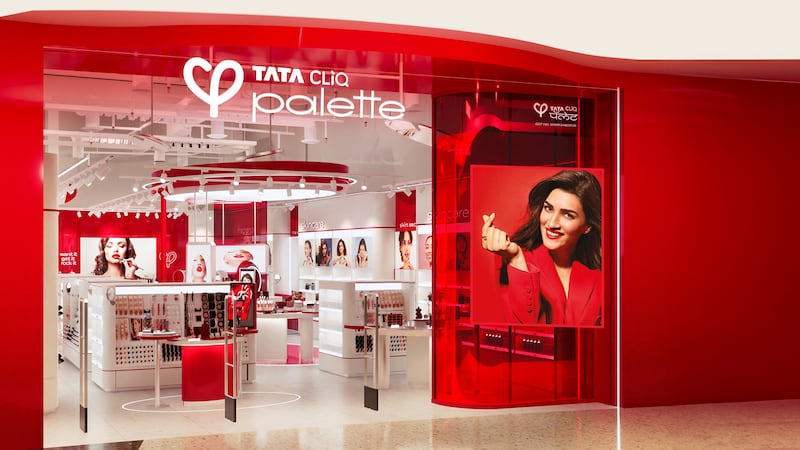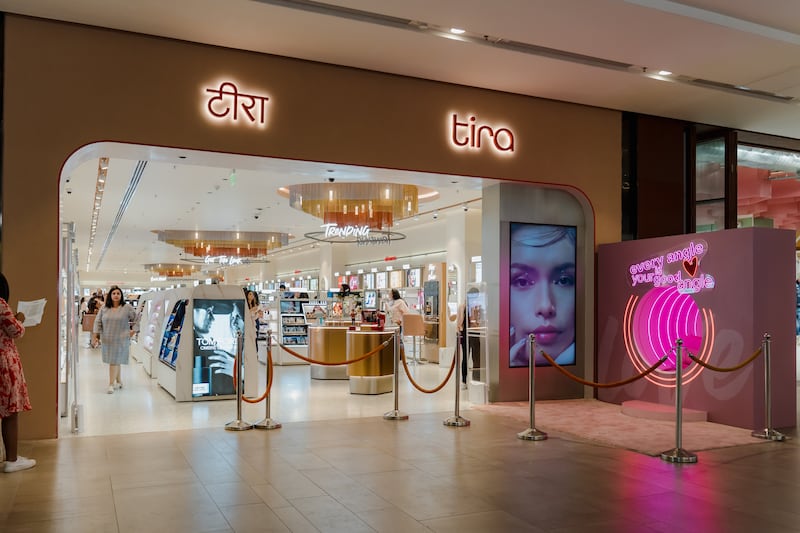
The Business of Fashion
Agenda-setting intelligence, analysis and advice for the global fashion community.

Agenda-setting intelligence, analysis and advice for the global fashion community.

Until recently, brands wanting a slice of India’s booming beauty market had to either go it alone or choose from a handful of partners. Among those retail partners, Nykaa was said to be leading Purplle and Sephora in the specialty segment while online giants Myntra and Amazon battled it out with department stores in the multi-category space. But earlier this year, two heavyweights of Indian industry threw their hats into the ring, launching multi-brand beauty outlets of their own.
Tira, an omni-channel platform owned by Reliance Retail, opened its second physical store in a Mumbai suburb in July. The new shop features a host of local and international brands such as Bobbi Brown, MAC and Forest Essentials, boasting features like smart mirrors, private skin consulting rooms and a sample vending machine. Its first campaign was released this month starring popular Bollywood celebrities Kareena Kapoor Khan, Kiara Advani and Suhana Khan.
The company clearly has big ambitions. “Our vision…is to be the leading beauty destination for accessible yet aspirational beauty… in India,” said Isha Ambani, executive director at Reliance Retail Ventures Limited, in a statement at the time of Tira’s launch in April. Her plans include a roll-out of stores in prominent locations and malls across the country.
But however aggressive a company’s expansion plan may be, building a physical footprint takes time. The more immediate threat Tira poses to incumbents in the market is in e-commerce. In the few months that have passed since Tira launched, the app has clocked over 1.5 million downloads and delivered a selection of products from 700 beauty brands to consumers in more than 100 cities.
ADVERTISEMENT
Tira is no run-of-the-mill challenger to players like Nykaa and LVMH-owned Sephora. Its ultimate parent company, Reliance Industries, is owned by Asia’s richest man Mukesh Ambani, and has interests in everything from oil and gas to telecoms and financial services. It is also one of India’s leading players in the fashion sector.
The group has been running fashion e-commerce site Ajio for seven years and its retail arm has over 50 partnerships with premium and luxury brands including Valentino and Burberry as well as investments in at least eight Indian designer brands. Reliance Retail Ventures, the holding company of all the retail units in the group, got a $1 billion injection in August from Qatar Investment Authority and is now reportedly looking to raise $2.5 billion more.
But Reliance isn’t the only deep-pocketed conglomerate able to take advantage of synergies with its fashion holdings to build a new beauty business. Tata Digital, owned by one of India’s largest sprawling conglomerates, Tata Group, launched Tata Cliq Palette, a multi-brand beauty platform in May. Its first brick-and-mortar store opened in August in Navi Mumbai, a city neighbouring Mumbai.
The Tata Cliq Palette app, which sells over a thousand beauty brands including Estée Lauder, MAC and Bobbi Brown, has had over a million downloads and the company plans to add 8-10 stores in its first year. “In year one… we will test [different store] models, sizes, locations, cities, [and choose] between high streets and malls. From year two onwards, we will double down on what works best… and you will see a massive scale up,” said K. Dharmarajan, chief business officer, Tata Cliq Beauty.
The platform’s ultimate parent company, Tata Group, knows a thing or two about growing a business. With diversified interests touching everything from steel and energy to cars and airlines, the group entered the fashion e-commerce race in 2016 through Tata Cliq and a subsequent luxury sub-platform which sells brands such as Versace, Coach and Paul Smith. The latter has also partnered with Richemont’s online multi-brand boutique TimeVallée, to offer watches from brands like Cartier, Piaget and Jaeger-LeCoultre.
Interestingly, the other Indian conglomerate flexing its muscles in the fashion industry in recent years, Aditya Birla Group, has not yet directly entered the beauty race. However, its new digital-first fashion and lifestyle venture Tmrw has indicated that it intends to expand into beauty and personal care. Also, the group’s retail unit, which has partnered with Galeries Lafayette, is planning to have a dedicated beauty space in the India locations of the French department store chain next year.
The retail value of India’s beauty and personal care market is currently worth $16.5 billion and is predicted to grow 11.5 percent to $18.4 billion by 2026, according to Euromonitor International.
The sector is attractive to India’s largest diversified conglomerates because it promises high returns, and because players like Nykaa have laid the groundwork. The digital-first company founded by Falguni Nayar has spent around 11 years introducing consumers to a wider variety of brands and educating them through social media channels.
ADVERTISEMENT
“As a packaged product business, the [beauty and personal care sector] is eminently scalable and suitable for [these] corporate businesses. The segment itself is large and consumption is growing rapidly,” said Devangshu Dutta, chief executive of retail consulting firm Third Eyesight.
According to McKinsey and BoF’s latest The State of Fashion: Beauty report, the per capita annual spend on beauty in India will grow to $15 by 2027, up from about $10 this year.
Conglomerates like Reliance and Tata have more than capital, connections and decades of experience (the former was founded in 1958 and the latter in 1868) to underpin any new venture they pursue. It is the scale of their respective ambitions for Tira and Tata Cliq Palette that could spell trouble for Nykaa, which currently accounts for about 27 percent share of India’s online beauty and personal care market, according to Elara Securities.
Though beauty industry experts contend that it’s still too early to predict who will rule the multi-brand beauty segment in the short term, most agree there is space for more players.

“Nykaa is really convenient. They’ve got a lot of global brands but it makes sense to have [players] like Tira and Tata Cliq Palette,” said Vasudha Rai, former beauty director at Harper’s Bazaar, Cosmopolitan and Women’s Health, India. “A monopoly anywhere is not good.”
What is less clear is how the new entrants will each tempt brands away from their competitors. Rai suggests that they could pay more attention to smaller brands that are overlooked by other platforms as the battle for market share at brand level intensifies.
“India is the last frontier from an investment point of view [which is why] everyone’s getting into it [but it’s still] a nascent market [so] even if there are another thousand brands launching here there will still be space for more,” said Samir Modi, founder and managing director at Indian brand Colorbar Cosmetics.
Modi’s view is interesting as his brand is not only sold through its own network of over 100 mono-brand stores but also a vast network of multi-brand outlets offline and online including Tira, Tata Cliq Palette, Nykaa, Purplle, Shoppers Stop and Myntra.
ADVERTISEMENT
While there are more multi-brand channels for brands to choose from, the market is in a state of flux. In July, for example, Indian billionaire investor and founder of Avenue Supermarts who runs hypermarket chain DMart, Radhakishan Damani, reportedly bought Bengaluru-based beauty and personal care retail chain Health and Glow for 750 crore rupees (about $89.9 million). The chain, which sells brands like L’Oréal, Maybelline and Lakmé, operates 175 stores.
Meanwhile, specialty multi-brand players Nykaa and Purplle and e-commerce majors Amazon, Flipkart and Myntra are all expanding aggressively. Multi-category operators like Indian department store Shoppers Stop, which sells brands including MAC, Estée Lauder and Clinique, recently said it plans to add 15 new standalone beauty stores to its current SSBeauty network of eleven. It also launched an app in April.
Collectively, these players are challenging a legacy of distributing beauty products in India through kiranas, unorganised retail in the form of neighbourhood ‘mom and pop’ shops, and pharmacies.
Even before the launch of Tira and Tata Cliq Palette, Nykaa faced competition from specialty retailers jostling for a bigger share of the market. Sephora, for example, which has over 25 stores in India, is now expanding its online presence with local partner Arvind Lifestyle Brands’ e-commerce site NNNow. At the same time, online multi-brand beauty retailer Purplle, whose app has crossed the 10 million download threshold, now runs eight physical stores.
Fashion retailers have also been signalling their intention to grow beauty. E-commerce giant Myntra lists over 1,400 beauty brands on its app and had plans to add more than 50 international brands this year. Lifestyle, a retailer owned by Dubai-based conglomerate Landmark Group, reportedly has plans to add 50 new stores in the next three-to-four years in India selling beauty products alongside fashion.

Beauty is the fastest growing segment for mass market department stores like Shoppers Stop. “We have witnessed a steady and impressive increase in the contribution of beauty to our company’s revenues,” said Biju Kassim, president of beauty at K Raheja Corp-owned Shoppers Stop, pointing to 23 new brand launches including Kilian Paris, Lancôme, Olaplex.
India’s pharmacy chains also stock a small but growing selection of beauty and personal care products. Apollo, which boasts over 5,500 stores, has an Apollo 24/7 app, for example, featuring products from brands like Lakmé, Maybelline, Avène and even some Nykaa products. Online pharmacy players like Pharmeasy and Tata-owned 1mg also have a limited selection. However, industry experts suggest that most pharmacies are not credible competition for specialty beauty players.
“This business is not sustainable for players who don’t have [their own brand] recall,” said Karan Taurani, senior vice president and research analyst at Elara Capital.
Meanwhile, Nykaa continues to hold a strong footing, posting 36.3 percent revenue growth to 5,144 crore rupees for the year ending March 2023. Profit fell 49 percent, but the beauty and fashion company plans to add 50 new stores this year.
“In smaller towns and cities [customers] don’t have too many physical locations where they can experience the best brands in the world and we want to give that to them,” said Anchit Nayar, chief executive of Nykaa Beauty.
A June note by Elara Securities pegs Nykaa’s broader target market at 133 million high and upper-middle income households; it says Nykaa only caters to about 10 million of these currently, giving it room for further growth.
“Given where Nykaa is positioned in terms of their product variety, their lead time has come down because they have invested in the supply chain, they have very good user experience on the app, they’re not prone to discounting and they have premium customers. Because of these factors, they may continue to stand out over the near-to-medium term,” said Taurani.
Nykaa has also announced significant investments in infrastructure like digitising warehouses. “As an e-commerce company, you need to have a very wide distributed network of warehouses so you can reduce the fulfilment cost. But more importantly, so you can reduce the delivery time for your customers,” said Nayar.
The battle between Tira and Tata Cliq Palette and the multi-brand incumbents will be fought on several battlegrounds.
Anand Ramanathan, partner and consumer industry leader at Deloitte India, suggests private labels and physical retail could be critical. “Typically brands squeeze… e-commerce retailers [in terms of] margins so profitability has to be contributed by private labels. And private labels alone might not make sense, so they also have to go physical,” said Ramanathan.
To their credit, both retailers are focussed on an omnichannel experience and their parent companies are more grounded in the Indian market than an international company like Sephora, which only entered India in 2013. Both are also curating a mix of Indian and global brands whereas Sephora skews heavily toward international brands.
It is not yet clear what plans, if any, Tira and Tata Cliq Palette have for private labels. But notably, Tata Group-owned Trent, which operates department store chain Westside, sells its own small beauty brands Studiowest and Nuon at its stores so Tata Cliq Palette could distribute those brands as they are part of the same group.
Dharamarajan says being as part of the Tata Group is an asset in other ways. Tata-owned Titan’s jewellery brands collectively have 792 stores across more than 250 cities in India, the Middle East and US. The group’s beauty platform Tata Cliq Palette could therefore learn from its parent in terms of “deciding where to open a store, [understanding] where the catchment areas are, [sharing] consumer [insights and] working relationships with mall developers… and [optimising] pricing and contractual terms.”

But Tata’s rival, Reliance Retail, also has a vast retail network to leverage, operating a chain of convenience stores, supermarkets and e-commerce ventures across the country besides interests in fashion, food, grocery, homecare and health. Even though Tira is a new beauty platform with only two physical outlets, Reliance could build its own private beauty brands (like Nykaa and Sephora have done) or go the inorganic growth route through acquisitions.
It is worth noting that Reliance has a history of creating disruptive businesses. In 2016, when the company launched its Jio mobile network with free and heavily discounted services, it caused a price war in the market, completely upending the telecom space. It now controls the largest share of that market.
“With over 250 million registered customers, Reliance Retail has a deep understanding of Indian consumer habits, shopping patterns and customer service expectations. It has also achieved expertise and economies of scale in areas such as logistics, warehousing and distribution,” said a source from Tira who spoke to BoF on the condition of anonymity.
But however important speed and convenience may be, multi-brand beauty players need strong brand equity and a distinctive assortment to stand out from the crowd. To earn the former, both new entrants will need more time on the market and, to achieve the latter, they will need to start tough negotiations to secure more exclusive products.
Digital-native brands with a razor-sharp focus on the latest trends jostle for position in a market set for rapid growth as big beauty conglomerates try to tighten their grip on power.
The Indian beauty unicorn is preparing for an IPO that could see it reach a valuation of $3 billion thanks to persuasive digital marketing and a hyper-local merchandise mix.
Estée Lauder and Puig are investing in Indian ayurvedic beauty brands, but can they overcome the many challenges associated with incorporating ancient practices into a modern, global business?
This week’s round-up of global markets fashion business news also features the China Duty Free Group, Uniqlo’s Japanese owner and a pan-African e-commerce platform in Côte d’Ivoire.
Affluent members of the Indian diaspora are underserved by fashion retailers, but dedicated e-commerce sites are not a silver bullet for Indian designers aiming to reach them.
This week’s round-up of global markets fashion business news also features Brazil’s JHSF, the Abu Dhabi Investment Authority and the impact of Taiwan’s earthquake on textile supply chains.
This week’s round-up of global markets fashion business news also features Dubai’s Majid Al Futtaim, a Polish fashion giant‘s Russia controversy and the bombing of a Malaysian retailer over blasphemous socks.